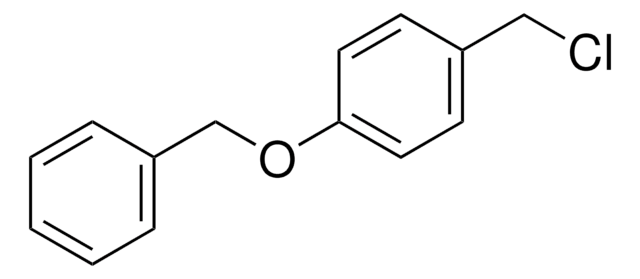All Photos(1)
About This Item
Linear Formula:
HOCH2C6H4CH2CO2H
CAS Number:
Molecular Weight:
166.17
MDL number:
UNSPSC Code:
12352100
PubChem Substance ID:
NACRES:
NA.22
Recommended Products
Assay
98%
form
solid
mp
131-134 °C (lit.)
SMILES string
OCc1ccc(CC(O)=O)cc1
InChI
1S/C9H10O3/c10-6-8-3-1-7(2-4-8)5-9(11)12/h1-4,10H,5-6H2,(H,11,12)
InChI key
FWZBPBKAANKOJQ-UHFFFAOYSA-N
Signal Word
Warning
Hazard Statements
Precautionary Statements
Hazard Classifications
Eye Irrit. 2
Storage Class Code
11 - Combustible Solids
WGK
WGK 3
Flash Point(F)
Not applicable
Flash Point(C)
Not applicable
Personal Protective Equipment
dust mask type N95 (US), Eyeshields, Gloves
Certificates of Analysis (COA)
Search for Certificates of Analysis (COA) by entering the products Lot/Batch Number. Lot and Batch Numbers can be found on a product’s label following the words ‘Lot’ or ‘Batch’.
Already Own This Product?
Find documentation for the products that you have recently purchased in the Document Library.
Richard Trilles et al.
Journal of medicinal chemistry, 62(4), 1971-1988 (2019-01-18)
Apurinic/apyrimidinic endonuclease 1 (APE1) is an essential base excision repair enzyme that is upregulated in a number of cancers, contributes to resistance of tumors treated with DNA-alkylating or -oxidizing agents, and has recently been identified as an important therapeutic target.
Violetta Mohos et al.
Biomolecules, 10(3) (2020-03-12)
Flavonoids are abundant polyphenols in nature. They are extensively biotransformed in enterocytes and hepatocytes, where conjugated (methyl, sulfate, and glucuronide) metabolites are formed. However, bacterial microflora in the human intestines also metabolize flavonoids, resulting in the production of smaller phenolic
Violetta Mohos et al.
International journal of molecular sciences, 20(11) (2019-06-05)
Quercetin is an abundant flavonoid in nature and is used in several dietary supplements. Although quercetin is extensively metabolized by human enzymes and the colonic microflora, we have only few data regarding the pharmacokinetic interactions of its metabolites. Therefore, we
Eszter Fliszár-Nyúl et al.
Biomedicine & pharmacotherapy = Biomedecine & pharmacotherapie, 131, 110732-110732 (2020-09-18)
Polyphenolic compounds (including flavonoids, chalcones, phenolic acids, and furanocoumarins) represent a common part of our diet, but are also the active ingredients of several dietary supplements and/or medications. These compounds undergo extensive metabolism by human biotransformation enzymes and the microbial
Our team of scientists has experience in all areas of research including Life Science, Material Science, Chemical Synthesis, Chromatography, Analytical and many others.
Contact Technical Service









